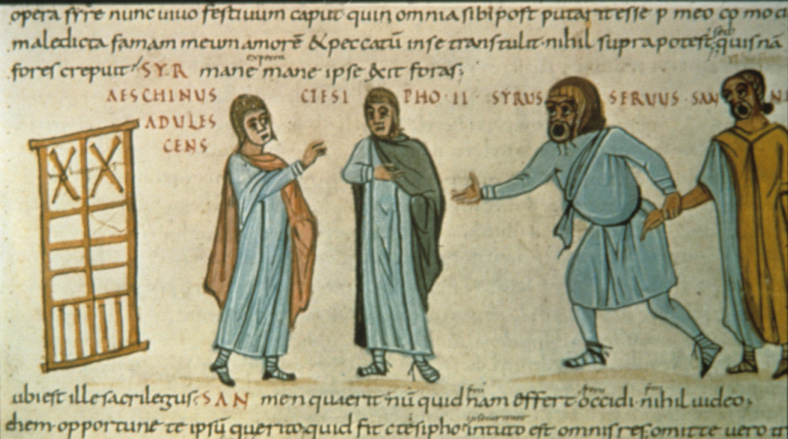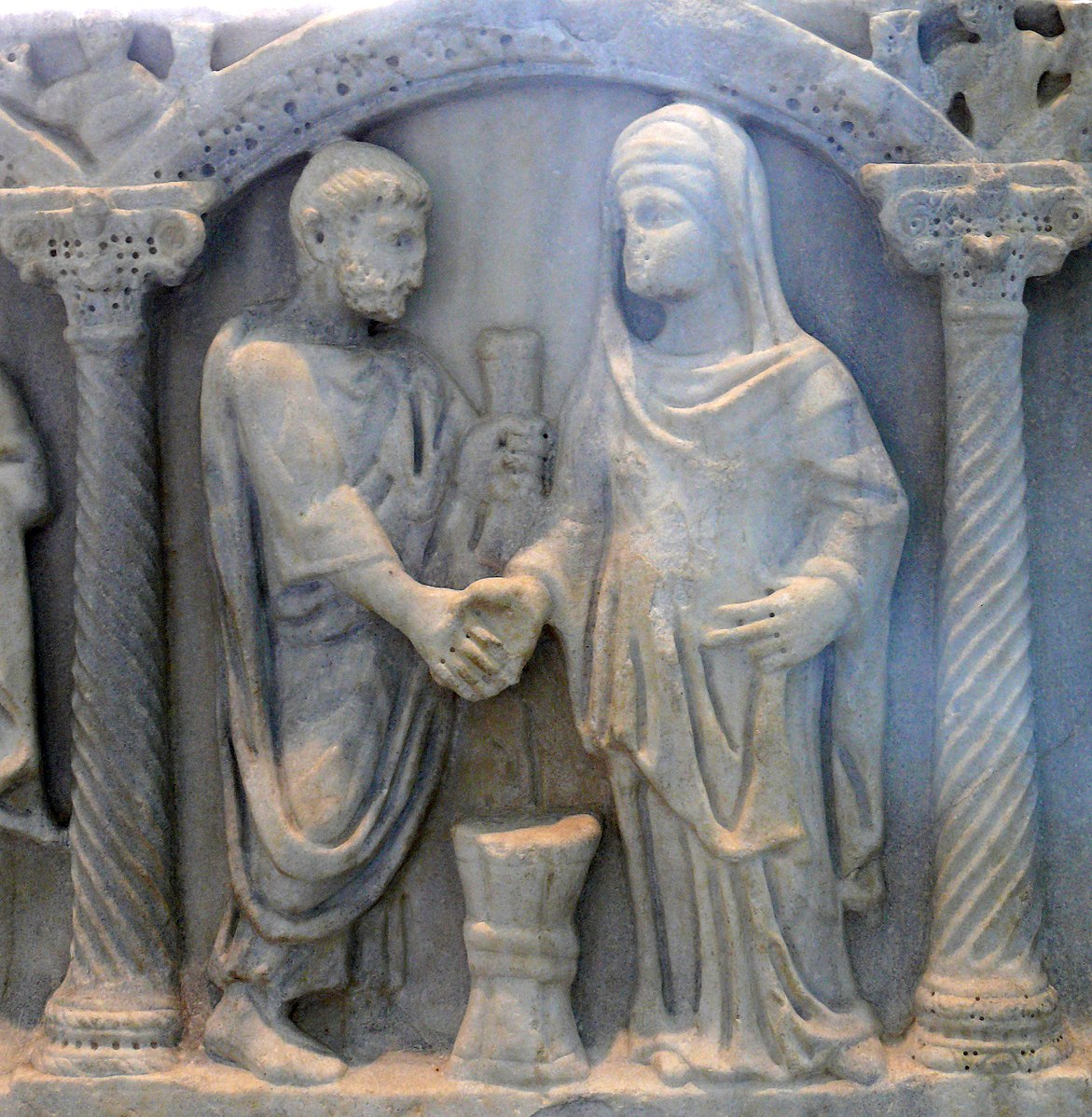Classics 357
paterfamilias
January 31, 2024

Roman genius/paterfamilias (1st century CE)
Response #1 Topics (due Wednesday, February 7)
Roman family: paterfamilias – father and master of familia
- paterfamilias: modern stereotype of tyrannical father vs. primary ancient legal sense ("estate owner") & complex social realities
- patria potestas ("pater's power") extends to children (biological & adopted), wife (if cum manu), slaves & other property
Twelve Tables IV.2
si pater filium ter venumduit, filius a patre liber esto, “If a father puts his son up for sale three times, the son shall be free from his father.”
- "power of life and death" (vitae necisque potestas) over children, from birth – law versus social reality? (few historical examples: ancient examples of loyalty to state (patria) over loyalty to family); family consultations
- paterfamilias (law & literature): manages household finances & patrimony (future generations), control of property (minor children have peculium), moral overseer, arrangement of marriages; patria potestas until death, but children can be emancipated or live outside paternal home
.jpg)
9th century CE illustrated manuscript of Terence's comedies
Terence’s Adelphoe (160 BCE; cf. Cato the Elder)
- a comedy of tensions/oppositions:
city ~ country
liberalism ~ tradition
(paternal) authority ~ affection
youth ~ age
nature (biology) ~ nurture (adoption)
fathers ~ masters
sons ~ slaves
duty ~ lack of responsibility/freedom
rich ~ poor
- older brothers/fathers: Demea vs. Micio; Demea's sons Aeschinus (city) & Ctesipho (country)
Adelphoe 41-77 (Micio's opening monologue)
My brother and I have been polar opposites since we were kids.
I’ve had an easy and leisurely life here in the city,
And—what some people consider paradise—
I’ve never been married. My brother? Just the opposite.
He lives in the country, he works hard, he scrimps and he saves,
He has a wife and they had two sons.
I adopted the older of the two, this Aeschinus I was just talking about.
I’ve raised him since he was a child and loved him as my own.
I take sheer joy in him, and he’s the most precious thing in my life.
I also take pains to see that he feels the same way about me.
I provide well for him, I look the other way, and I don’t impose
My paternal authority all the time; I’ve actually trained my son
To keep me in the loop about just the sorts of things
Youngsters are always trying to hide from their fathers.
To my thinking, a boy who’s been trained to con his father,
And dares to do it, has no qualms about snowing others.
I believe we can discipline our children best by generosity, [liberalitas]
And by cultivating a sense of respect—not just fear.
My brother disagrees with me on that and has no stomach whatsoever
For my views: “What are you doing, Micio?
Why are you ruining the boy we both care so much for?
Why’s he’s whoring about? Why’s he out drinking? Why give him
So much spending money for that, and for a wardrobe? You’re such a fool!”
He’s far too strict, and goes way beyond what’s reasonable.
Now in my opinion, he’s making a big mistake in assuming
That authority based on intimidation has more weight
Or lasts longer than when it’s rooted in friendliness.
My thoughts on this matter?
A person who only does his duty under duress
Does so as long as believes someone’s watching;
If he thinks he can get away with something, his true character resurfaces.
The person you’ve won over with kindness is sincere,
And wants to give back what he got, whether you’re there watching him or not.
Proper paternal training results in a son who does what’s right on his own,
And not just because someone else threatens him.
That’s the difference between a father and a master. If a father can’t do this, [pater ~ dominus]
He should own up to the fact that he has no true authority over his children.

Adelphoe, Scene 6 on an illustrated manuscript of Terence (9th century CE)
- Complication #1 (recent unlawful activity): Aeschinus at Sannio's brothel (Micio concerned, 141ff.); resolution? revelation about abduction of stripper?
- Complication #1 (previous unlawful activity): Aeschinus & Pamphila, daughter of Sostrata (Canthara (nurse) to Sostrata, "If she had to get raped, it's best that a young man like him was involved", 296)
- current confusion & fear of Sostrata's household?
- Demea's confusion? Mockery & duping by clever slave Syrus (2 wild goose chases, farm & city)
- intervention of Hegio (male guardian); attitude toward rape?
- Aeschinus' forced confession & father's consent to marriage (Scene 16), "Is this what it means to be a father or a son? / If he were my brother or a close buddy, he couldn't have done any more for me! / How can you not love him? And don't you just want to hug him?" (707-9)
- Demea & Micio meet (Scene 18): wedding, stripper to live with Micio; Demea morally outraged (Micio, "The single defect that only increases in us with age / Is our overriding obsession with money", 833-4)
- Demea finally learns of Ctesipho's role (Scene 21)
Adelphoe 855-881 (Demea questions his ideology of parenting)
No one has ever plotted out his life’s plan so successfully that he never faces
New challenges and discoveries brought about by circumstances, the passing of time,
Or experience itself. Inevitably, you discover you don’t know what you thought you did,
And the principles we first formed don’t hold up in the face of everyday practice.
That’s where I am. As I approach my life’s homestretch,
I have decided to renounce the frugal life I’ve lived up to this very moment.
Why? The realities of human life have taught me to place nonchalance
And leniency above all else. To see the wisdom in this, just compare my brother and me.
For him, life is a leisurely and endless stream of parties.
He’s generous, easy-going, never offensive and has a smile for everybody.
His prime responsibility is to himself, he spends money on himself,
And everyone respects and likes him. Me? I’m the typical farmer:
Boorish, gloomy, cheap, fierce, stubborn—and married. And what misery that has been!
The birth of my sons? More stress. Phew! I wore myself down wanting to earn
As much as I could for them, and ground my life away in search of more stuff.
And now at the end of my life what are the fruits of all my labors?
Their contempt! Meanwhile, my polar opposite enjoys the benefits of fatherhood
Without lifting a finger. They adore him, they avoid me. They confide in him,
They worship him and his company, while I’m left all alone.
They want him to live forever, but are looking forward to my death.
It took all my energy to raise them, but he’s won them over at minimal cost to himself.
I get all the misery, he experiences all the joy! All right then, I’m up for a little experiment.
I’ll be the anti-me, and see if I can talk a smooth game and act generously like him.
He’s challenged me after all.
I want to be loved and respected by my children as much as he does.
If the path to that is generosity and indulgence, don’t count me out!
Bankruptcy? That’s of least concern to the person who’s oldest.


Wedding (Roman sarcophagus, 4th century CE)
- final settlement (marriage without dowry, limits to generosity?): Micio's expenses?
- a clear "winner" in the end?
Adelphoe 986-997 (closure)
Demea
It was to show that the reason the boys consider you to be so approachable
And jovial is not because your life is truly just and good at the core,
But only because you agree with whatever they want, spoil them,
And lavish money on them, Micio. Now if my way of living is so repulsive to you,
Aeschinus, just because I don’t indulge you in whatever you do, regardless of
Whether it’s right or wrong—I’m through here. Buy, squander, do whatever you want!
But when you’re not seeing things clearly because of your age,
Or pulled along too much by your desires and too little by your brains,
If you want me to grab hold of you and straighten you out or provide some support
When it’s needed, I’ll be there for you.
Aeschinus
We admit it, father:
You know what's best. But what about my brother? What happens to him?
Demea
I'll let him keep her, but this is the last time.


.jpg)


